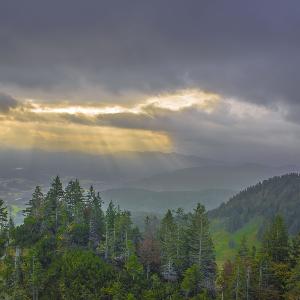“I would give nature rights”
7 Jun 2022
Jens Kersten, an expert in constitutional law, conducts research into the environment and society in the Anthropocene – and supports an international movement to provide nature with better legal protection.
7 Jun 2022
Jens Kersten, an expert in constitutional law, conducts research into the environment and society in the Anthropocene – and supports an international movement to provide nature with better legal protection.

© LMU
Interview with Professor Jens Kersten, Chair of Public Law and Governance at LMU.
Mr. Kersten, to what extent does our environment already enjoy legal protection?
Jens Kersten: Here in Germany, we have regulations and laws to protect nature and the environment on virtually every political level – from the local and regional levels to the national level. Local authorities have very good planning tools to protect nature in the vicinity of a new construction zone, for example. On the other hand, it is much more difficult to get owners to make their houses climate-friendly – for instance because the basic right to freedom of property ownership collides with environmental protection concerns.
At the regional level, there are lots of new approaches to transform the relationship between nature and property. The constitutions of the eastern German states in particular have brought forth innovative environmental law provisions. The EU has developed a large potential for ecological innovation – above all with regard to environmental information, environmental impact assessments and class action rights. Beyond these measures, criminal law also guards against the destruction of the environment, such as when waste is disposed of illegally.
Germany needs fundamental ecological reforms, especially at the federal level and, in particular, in the Basic Law.Jens Kersten
Yet you support a global movement of legal professionals and environmental protection organizations who demand better legal protection for nature. What could still be improved?
Germany needs fundamental ecological reforms, especially at the federal level and, in particular, in the Basic Law. Constitutionally, things do not look good in this country. True, the constitutional reform that followed German Reunification did add environmental protection to the Basic Law as a national policy objective in 1994, and this was followed by animal welfare in 2002. We are talking about Article 20a of the Basic Law, which literally states: “Mindful also of its responsibility toward future generations, the state shall protect the natural foundations of life and animals by legislation and, in accordance with law and justice, by executive and judicial action, all within the framework of the constitutional order.” But the wording of these ‘national policies’ is far too vague from a legal perspective. Moreover, they recognize only one single actor: the state.
In Germany, the state alone decides how and, above all, to what extent nature and animals are to be protected. Citizens have no ecological rights with which to compel the state to provide effective protection for nature and animals under constitutional law. That is why we need a fundamental ecological transformation of the Basic Law.
What about the principle of ecological sustainability, which is one expression of the national policy objective of protecting the environment?
It is a good thing that the principle of sustainability has evolved into a kind of global principle, that is for sure. But the problem with the principle of sustainability is that it unleashes no normative guiding forces with a view to our pressing ecological problems.
That is because we understand sustainable development as a trade-off between societal, economic and ecological interests. However, given the exponential extinction of species, the mountains of waste piling up in the world and, above all, the climate disaster, this three-dimensional understanding of sustainability is not getting us anywhere.
We therefore have to ask ourselves: What comes after sustainability? And in my opinion, the answer is: We need an ecological revolution of our constitution.
Past revolutions have fought for and won civil liberties and social rights. Following on from these civic and social revolutions, we now need an ecological revolution in our constitutional order.Jens Kersten
What could the kind of “ecological revolution” you are advocating look like?
Past revolutions have fought for and won civil liberties and social rights. Following on from these civic and social revolutions, we now need an ecological revolution in our constitutional order. In the course of this ecological transformation of the Basic Law, we must introduce ecological rights such as a right to ecological integrity, i.e. to a healthy environment.
Furthermore, we need to stake out effective ecological boundaries around existing basic rights – above all around economic freedom and the freedom of ownership. Ultimately, we also want to recognize rights of nature.
Are there any examples of the rights of nature in other countries?
Especially in light of indigenous influences, the Ecuadorian Constitution recognizes nature as a legal person. According to this constitution, nature has the right to full “ecosystem protection”. Ecosystems and ecological cycles are thus protected as a right of nature, and citizens can take collective legal action to sue for compliance.
Here in Germany too, jurisprudence advocates integrating comprehensive ecosystem protection in the Basic Law as a right of nature, arguing that, in line with environmental protection as a national policy goal, this should then be spelled out in the Basic Law as the new Articles 20b ff.
I would give nature basic rights, but with more nuanced formulations.Jens Kersten
Do you think that is a good idea?
I would do things differently. I would give nature basic rights, but with more nuanced formulations. I anchor this understanding in the wording of Article 19 (3) of the Basic Law. According to this provision, legal persons – such as clubs, limited liability companies and stock corporations – can have recourse to those basic rights that apply to them by virtue of their nature.
The same provision should also be valid for ecological persons. If that were the case, animals, for example, could have recourse to the basic right to life and physical integrity. An ecosystem could have recourse to the inviolability of the home. It would then be the job of the democratically legitimated lawmaker to flesh out these rights just as it has done in the realm of commercial law for trading companies, limited liability companies and stock corporations. What works for dead capital will certainly work for living nature.
Which provisions still need to be amended in the Basic Law?
We should include ecology in the fundamental normative principles of the state enshrined in Article 20 (1) of the Basic Law. This would establish the Federal Republic as a democratic, social and ecological federal state. Ecology would thus take its place alongside the principles of a democratic, republican and social federal state governed by the rule of law.
In other words, ecology too would be part of the ‘DNA’ of our state and environmental protection would have to find expression across the entirety of governmental organization.

Professor Jens Kersten | © privat
What would that mean in practice? We would, for example, have to make our parliamentary system of government more sensitive to nature by assigning new ecological functions to government bodies. Each year, parliament – the Bundestag – would then have to have an ecological budget debate in which the Chancellor presents and assumes responsibility for the ecological directives of the federal government. In addition, it would be imperative to give the Minister for the Environment a right to veto federal government decisions of ecological significance. But these are just a few examples. There are plenty more things I could think of.
Constitutional law expert Jens Kersten has held the Chair of Public Law and Governance at LMU since 2008. Alongside environmental protection, his research focuses on areas such as constitutional, administrative and European law, bioethics and law, digital governance and democracy, demographic change and social cohesion. Before moving to LMU, Kersten served as Professor of Spatial Planning and Environmental Law at TU Dortmund University and, from 2012-2013, as Carson Professor at LMU’s Rachel Carson Center for Environment and Society.